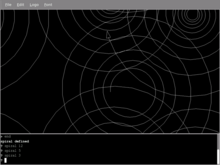Berkeley Logo: Difference between revisions
Jump to navigation
Jump to search
Garycmartin (talk | contribs) |
Garycmartin (talk | contribs) |
||
| Line 22: | Line 22: | ||
[[Image:Berkeley Logo Screenshot.png|thumb|220px|Screenshot taken of Berkeley Logo v3 running on an XO, doesn't support Journal or a Sugarized UI yet, but does run quite well.]] |
[[Image:Berkeley Logo Screenshot.png|thumb|220px|Screenshot taken of Berkeley Logo v3 running on an XO, doesn't support Journal or a Sugarized UI yet, but does run quite well.]] |
||
When UCBLogo first starts up the screen is fully taken up by the interactive text input area. When you issue you're first graphic instruction the screen will automatically split into a graphic and text input area. Here's some simple example instruction to try: |
When UCBLogo first starts up the screen is fully taken up by the interactive text input area. When you issue you're first graphic instruction the screen will automatically split into a graphic and text input area. Here's some simple example instruction to try: |
||
HELP "FORWARD |
|||
Now you know how to get help on a command: |
|||
FORWARD 100 |
FORWARD 100 |
||
| Line 32: | Line 36: | ||
RIGHT 90 |
RIGHT 90 |
||
Or |
Or for less typing use a repeat loop: |
||
REPEAT 4 [FORWARD 100 RIGHT 90] |
REPEAT 4 [FORWARD 100 RIGHT 90] |
||
Revision as of 22:45, 14 September 2008
|
see more templates or propose new |
Berkeley Logo (UCBLogo) is a free, GPL interpreter for the Logo programming language. It runs in an XO activity window, but isn't yet Sugarized in other ways, such as using the Journal.
Get the activity
Sourceforge svn repository
Quick graphical examples
When UCBLogo first starts up the screen is fully taken up by the interactive text input area. When you issue you're first graphic instruction the screen will automatically split into a graphic and text input area. Here's some simple example instruction to try:
HELP "FORWARD
Now you know how to get help on a command:
FORWARD 100 RIGHT 90 FORWARD 100 RIGHT 90 FORWARD 100 RIGHT 90 FORWARD 100 RIGHT 90
Or for less typing use a repeat loop:
REPEAT 4 [FORWARD 100 RIGHT 90]
Or make it a procedure:
TO square REPEAT 4 [FORWARD 100 RIGHT 90] END square
User Documentation
As a plain ASCII text file:
As nicely formatted HTML:
As nice looking PDF:
